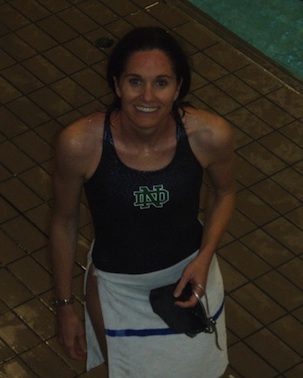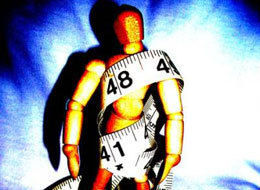
It was January of 1992.
I was a junior at Saint Mary’s College in South Bend, Indiana. There was a blizzard the night before, and a friend and I were supposed to eat breakfast with another friend who lived on campus. We made it over to room after trudging through the snow, and breakfast smelled delicious, but by the expression on her face, we knew something was terribly wrong.
The night before, the bus transporting Notre Dame’s women’s swim team hit a patch of ice and flipped over on the side of the road about four miles from campus. Two of the students died, and one had been paralyzed.
The three of us held hands for a moment of silence followed by a prayer.
I remember that moment as clearly as I do the explosion of the space shuttle Challenger. So I was a bit taken aback when I heard the announcement after church last Sunday that a woman who was supposed to be paralyzed for the rest of her life, one of the women on the Notre Dame bus that crashed in 1992, would be the featured speaker of the adult lecture series.
Haley Scott DeMaria was the Notre Dame swimmer who lost two of her teammates and laid in the snow unable to move anything on the night of January 24. The 18-year-old was told by the medical staff that she would never walk again, and that the sooner that she accepted her condition and fate, the better.
As I sat in the audience, listening to her story, I was inspired by her shear determination and perseverance.
She dismissed the nurses who said she was in denial to think she’d ever be able to use her legs again. Instead, she fought. She fought so hard. Every day. Through multiple back surgeries and physical therapy. She didn’t give up when it would have been so easy to.
I recognized the tools of empowerment that she spoke about–faith, family, friends, community–as those of us with chronic illnesses and severe mood disorders employ every day to make it through the day. And I really related to the times of grieving she described … when she so wanted her old life back again. She would say to herself during those moments, “That life is gone. Let it go. But answer this question: What do you want from your life now?”
Like Haley, I yearn for my old brain chemistry and healthy condition … the old days before I had to make appointments with five kinds of doctors (endocrinologist, cardiologist, internist, psychologist, and psychiatrist) … before my pituitary tumor and valve regurgitation, and before I was diagnosed with bipolar disorder and Raynaud’s Phenomenon.
But that’s a useless exercise.
However, I CAN ask myself, “Where do we go from here?” Let’s think about all the things we CAN do, and let’s try like hell to make progress. So, whether it’s numbness in our legs and painful cramps in our back like Haley experiences, or a black out in the emotional center of our brain … we can trudge forward together in our limitations, maybe even BECAUSE OF our limitations, in the sense that they give us new meaning for our life.
To read more about Haley’s story, visit her website at www.HaleyBook.com.
* Click here to subscribe to Beyond Blue and click here to follow Therese on Twitter and click here to join Group Beyond Blue, a depression support group. Now stop clicking.

